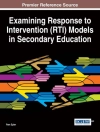Much applied research takes place as if complex social problems–and evaluations of interventions to address them–can be dealt with in a purely technical way. In contrast, this groundbreaking book offers an alternative approach that incorporates sustained, systematic reflection about researchers’ values, what values research promotes, how decisions about what to value are made and by whom, and how judging the value of social interventions takes place. The authors offer practical and conceptual guidance to help researchers engage meaningfully with value conflicts and refine their capacity to engage in deliberative argumentation. Pedagogical features include a detailed evaluation case, ‘Bridge to Practice’ exercises and annotated resources in most chapters, and an end-of-book glossary.
Winner (Third Place)–American Journal of Nursing Book of the Year Award, Community/Public Health Category
विषयसूची
1. Expanding the Conversation on Research Ethics
2. From Value Neutrality to Morally Informed Research
3. The Conventional Frame for Evaluating Social Interventions
4. Expanding the Conventional Frame for Evaluating
5. An Emerging Alternative Frame for Evaluating
6. Evaluating as a Multifaceted Investigation of Value
7. Valuing, Evaluating and Professional Responsibility
Glossary
References
लेखक के बारे में
Thomas A. Schwandt, Ph D, is Emeritus Professor of Educational Psychology at the University of Illinois, Urbana–Champaign. He has written extensively about evaluation theory and practice. Dr. Schwandt is a recipient of the Paul F. Lazarsfeld Award from the American Evaluation Association for his contributions to evaluation theory. He is editor emeritus of the American Journal of Evaluation; serves on the editorial board of Evaluation: The International Journal of Theory, Research and Practice; and is a member of the Evaluation Advisory Panel of the Independent Evaluation Office of the United Nations Development Program.
Emily F. Gates, Ph D, is Assistant Professor in the Department of Measurement, Evaluation, Statistics, and Assessment in the Lynch School of Education and Human Development at Boston College. A recipient of the AEA Marcia Guttentag Promising New Evaluator Award from the American Evaluation Association, Dr. Gates has extensive experience conducting mixed methods evaluations of programs, primarily in K–12 and higher education; science, technology, engineering, and mathematics (STEM) education; and public health. Her research examines the intersecting areas of systems thinking and approaches, values and valuing, and equity in evaluation theory and practice. She was an evaluation fellow in the Office on Smoking and Health at the U.S. Centers for Disease Control and Prevention.












